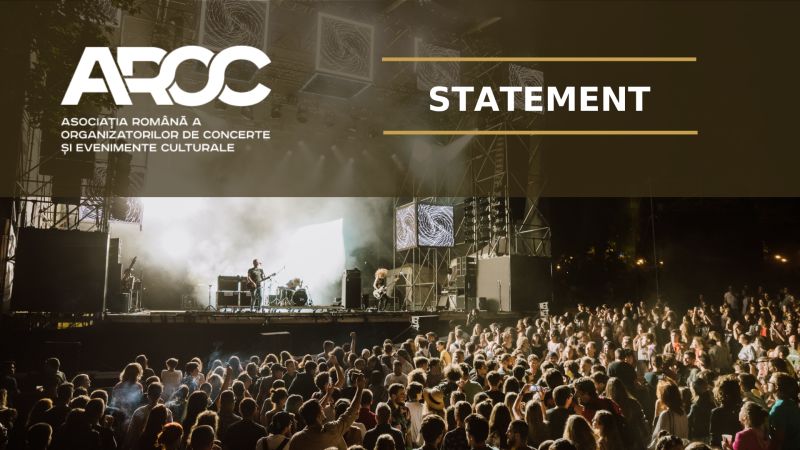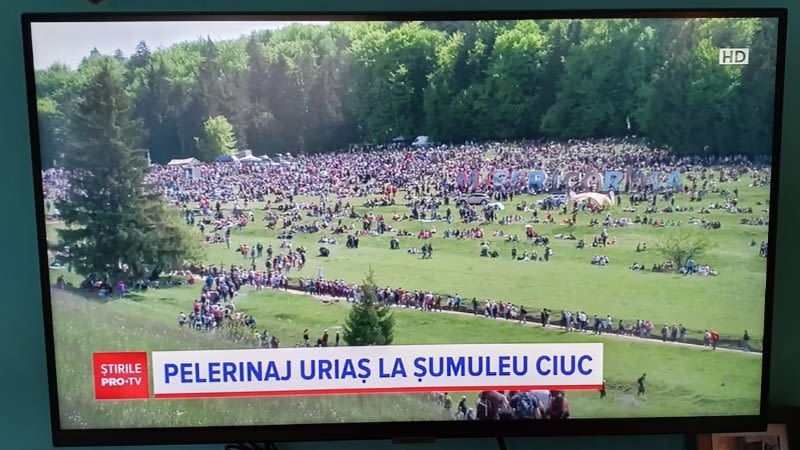OPEN LETTER regarding MODIFICATION OF THE VAT RATE FOR CULTURAL EVENTS
TO
The Ministry of Finance
To Mr. Marcel Boloș, Minister of Finance
FOR AWARENESS
The Government of Romania, Mr. Marcel Ciolacu, Prime Minister
Ministry of Culture, Mrs. Raluca Turcan, Minister of Culture
OPEN LETTER
regarding
MODIFICATION OF THE VAT RATE FOR CULTURAL EVENTS
Dear Minister Marcel Boloș,
The news that the VAT rate will increase from 5% to 19% for the sale of tickets to cultural events has created the biggest unrest in recent years among event organizers and cultural organizations. The only time perceived as worse than now was during the pandemic, when we were effectively shut down.
In addition, according to the latest statements in the press, we see how you are trying to make a separation between the festival format and the cultural event format, trying to charge more for festivals than the rest of the events. We believe that this way of approach represents a big discrimination against festivals.
The festival is a cultural event to the same extent as a concert or any other cultural event, differing only in duration and format. Moreover, the festival often serves as a good context for expression for non-established artists who do not sell tickets in their own name, and can be a good solution for an audience who cannot afford to go to several concerts, if they have to to pay a ticket for each. Also, the large number of festivals is also explained by the fact that this form of organizing an event is easier to achieve given the lack of infrastructure suitable for the cultural segment that the Romanian state should have facilitated by now.
It must also be said that, given the international awards that many festivals in Romania have won, these events have contributed substantially to our national identity and to the promotion of the country abroad.
Do you think there is a difference between organizing 30 concerts in a row, in 30 days, or organizing them together in 3 days, so that they have different VAT rates?
We ask that you look at the festivals from the same perspective as other cultural events and give them the importance they deserve. Next, we will present our views in a general context, including festivals among cultural events, as they should be in a normal world.
The Romanian Association of Promoters and Cultural Event Organizers (AROC), on behalf of its members, presents you with seven big reasons why the VAT increase will have serious consequences for the private event sector.
Increase of the VAT rate:
• WILL NOT BRING MORE MONEY to the state budget;
• will generate unsustainable price increases for tickets to events;
• will influence the abolition of many jobs and smaller organizations will disappear;
• will transform the music events industry into the most taxed industry in Romania;
• local public authorities will become the main competitors of private organizers;
• will reduce the indirect impact that the events sector has on the economy;
• proves once again the misunderstanding and disinterest of the public authorities towards the cultural sector.
1. More money will not come to the state budget
The increase in contributions from artistic shows would only occur if the number of tickets sold annually were as high or higher in the following year. But this will not be the effect. The increase in the VAT rate will generate growth on ticket prices, implicitly a decrease in cultural consumption, a decrease in the capacities of event organizers and a decrease in the quality of the cultural market in Romania.
Do not forget that the event market in Romania is still recovering after the pandemic years, when we were not supported with any real and concrete measures by the Government and during which consumer behavior changed dramatically.
2. Unsustainable prices for tickets to events
In this scenario, organizers will be faced with the following decisions. Either to:
• maintain quality, but make tickets more expensive, assuming a decrease in sales;
• decrease the quality, but keep the same prices, which will be "charged" by the cultural consumers;
• to sacrifice part of the profit, which is unsustainable because, in general, the events have a profit margin of 5-15%, this if all the financial projections are achived (the number of pre-sales tickets are sold, all the targeted financial partners are identified etc.).
None of the above scenarios are beneficial or correct. It is unfair and unintelligent for an organizer to be faced with the decision to do their job either deliberately worse, or lose money or damage their relationship with the community they've created.
3. Loss of jobs and of many smaller organizations
The changes to which organizations in the cultural environment will be forced to face will be brutal. In the search for cost efficiency, many organizations will cut jobs or will work with fewer suppliers, and small organizers will risk going out of business altogether.
4. Current fees of an event / festival
We present you an example (which is maximally) with the taxes that must be paid from the tickets sales by an organizer, in the case of an increase of the VAT rate:
• VAT - 19%
• Music stamp - 5%
• Heritage (if events take place in heritage locations) - 2%
• Red Cross - 1%
• Local tax - 2%
• Music copyright and broadcasting fees - up to 12%
TOTAL: Taxes up to 41%
To these is added the commission to the ticketing platforms, which is on average 5% and which, although it's not a state tax, is necessary for an organizer since it's much more expensive to make their own ticketing system. It should be noted that, from the money collected by the ticketing platforms, a part also goes to the state in the form of income/profit tax.
We can conclude that an event organizer can end up paying even 46% (almost half) of the money collected on tickets and has a little more than half left for fees, organization, administrative expenses, and also make a profit, or this scenario is actually absurd.
5. Local authorities versus private organizers
It can be seen clearly that the number of events organized with public money has grown steadily. Events disguised as city days or audience development actions, which are in fact personal ambitions of public officials who do not have the same rules as private organizers: they do not have the pressure of financial success, they do not have the pressure of mobilizing resources, they do not have the pressure of the sale of tickets (many are free entrence and those that are on tickets, practice unjustifiably low prices compared to the reality of the costs).
The context is already difficult, but the increase in the VAT rate will make town halls and other local authorities the most powerful event organizers in the country.
6. The indirect impact on the local economy that the cultural sector currently has
Cultural events and organizations in Romania:
• generates cultural tourism, which contributes economically through the HoReCa sector, in particular;
• generate money directly for suppliers of equipment, HoReCa, logistics, printing, etc., who in turn pay taxes to the state;
• generate jobs, for which taxes are paid;
• generate European funding.
This is only from an economic perspective. But there is also the diplomatic value here.
7. Also, in the events industry there is no desired dialogue between public authorities and the private environment
The proposed measure, namely to increase the VAT rate, only aims at a short-term impact (in our opinion, wrongly anticipated) and does not take into account the long-term impact it will have on the market. It is a brutal measure for many and it was taken without consideration of the representatives of the events industry in the country.
Culture cannot be seen only as a purse from which money comes out. The impact of culture is much more valuable in the development of society. Concerts, festivals, all cultural contexts created with passion by the people behind them, inspire the public, give reasons for local pride, help society develop.
In addition to all this, the cultural sector creates thousands of jobs and "throws" money into the market for thousands of suppliers. This extra pressure, caused by the increase in the VAT rate, will diminish this positive impact and the negative financial impact will be much greater than the assumption of the Ministry of Finance that more money will come to the state budget.
The cultural sector received little to no support during the pandemic years and survived mostly on the organizers' ambition not to give up on their industry. Now, instead of being supported or at least left in peace, it receives another hard kick from those who are supposed to protect and help it.
Churchill's World War II quote about cutting Britain's culture budget is famous around the world: "And then what are we fighting for?". Well, we, part of the representatives of the cultural sector, ask you a question in the same tone: Why do we do all these things?
Mr. Minister Marcel Boloș, with all due respect, it is very difficult to write an argumentative and technical letter in defense of the cultural field, while repressing our feelings of anxiety and anger for the way we are treated in this country. If you go ahead with this measure, you will enter the negative history of this country regarding how Romania perceives art and culture, one of the economic sectors that brings a sense of hope and joy to its consumers, respectively positive image and respect from abroad.
Let's not forget the fact that cultural events, from concerts to festivals, continue to serve the positive image of Romania abroad. The cultural tourism generated by this sector has a direct impact on the image of the country and an indirect one on other sectors (HoReCa, local businesses, etc.)
In the long term, the consequences of this measure will be:
• many organizations will not cope and will close business;
• the artistic quality of all events will decrease;
• the number of internationally established artists who will perform in Romania will decrease;
• frauds will increase;
• the number of events with free access will increase (which will destabilize the market);
• many people will lose their jobs;
• certain services (logistic rentals, etc.) will become more expensive;
• many Romanian artists will disappear due to fewer opportunities;
• the money returned to the state will be less then predicted;
• the public will consume fewer events, for financial reasons.
Access to culture is a constitutional right, or this increase in the VAT rate does nothing but limit the access to culture of many citizens.
We urge you to reconsider the proposed measure and we also request a formal meeting between AROC representatives and Government representatives. All we want is to present our points of view, make ourselves understood and open a door of collaboration with the central authorities of the state. Our industry is important but misunderstood. It is time to change this status.
Sincerely
Romanian Association of Promoters and Cultural Events Organisers
Signed by AROC, the Romanian Association of Promoters and Cultural Event Organizers, the associative structure of the organizers of festivals and concerts in Romania, is made up of the most representative actors on the Romanian market (ARTmania - ARTmania Festival Sibiu/Blaj aLive, Asociația Fapte - Jazz in the Park, Transilvania Film Festival Association - TIFF, BESTMUSIC Live, Comparty Events - diMANSIONS Hit Music Festival, Electric Castle, Emagic Live - Awake Festival, Expirat, Nuit Sociale, Movement Team - Sports Festival, NEVERSEA, Plai Cultural Center - Plai Festival /JazzTM, Summer Well, The Institute, Showberry – Rocanotherworld/Classix Festival, UNTOLD UNIVERSE, Wise Factor - The Fresh)



